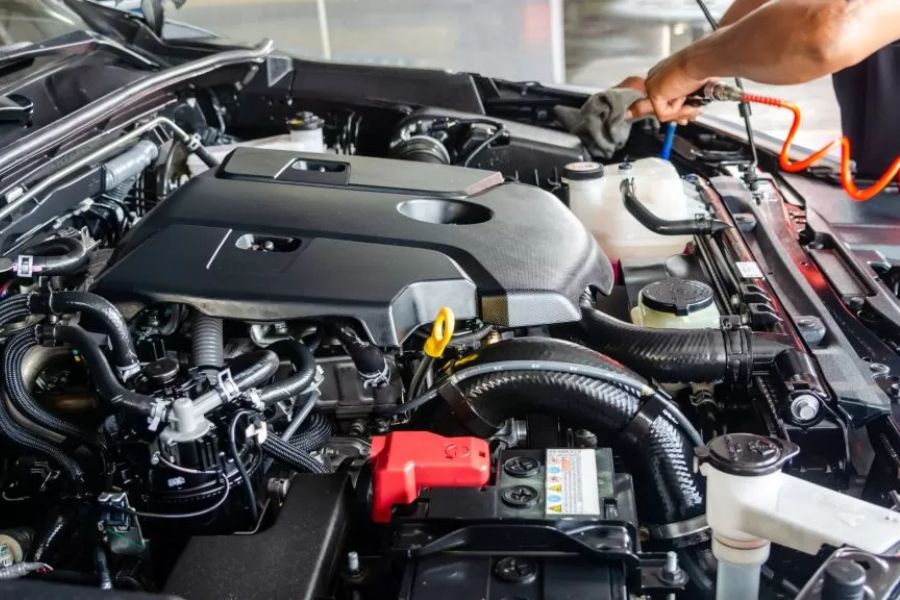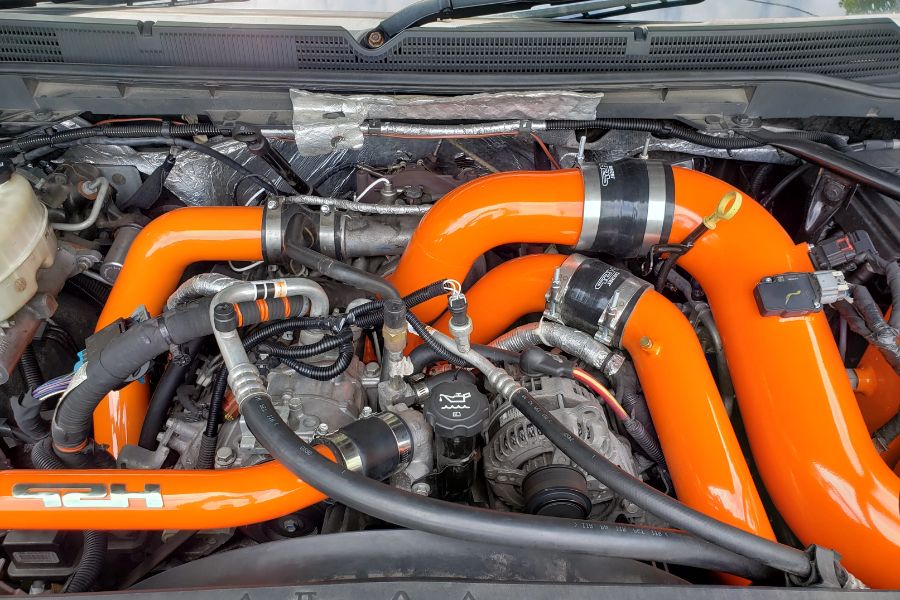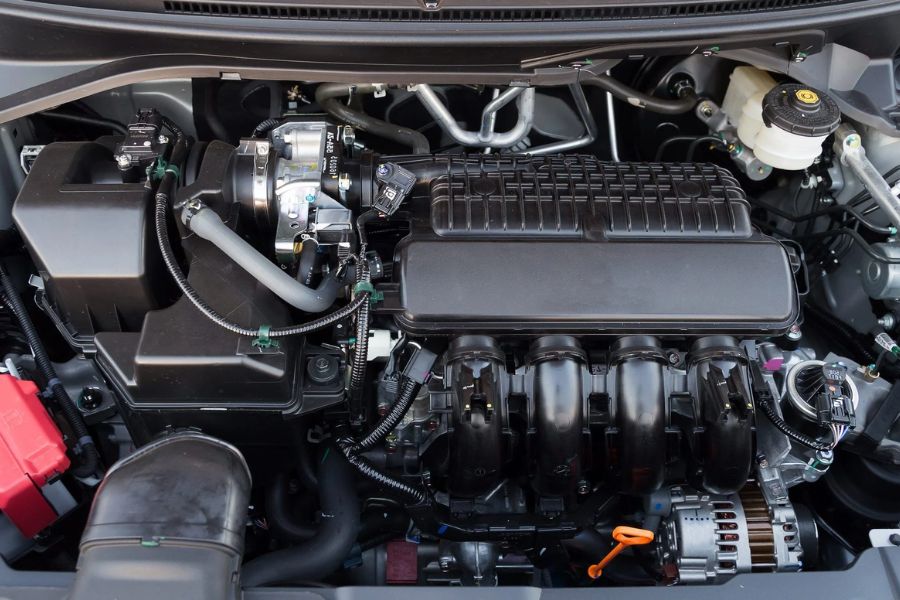Ever hear a strange rattle from your car’s engine? It may sound like a small problem, but don’t brush it off! In this blog, we take a deep dive into what causes that rattling when your car is idle or when you’re speeding up.
We’ll show you why it’s important to sort this issue out quickly. Ignoring it could cost you big time, even lead to a breakdown. So, let’s roll up our sleeves and get your car purring like a kitten again!
What Causes Engine to Rattle and How to Fix It
We’ve all been there. You’re in your car, the engine is idling, and you hear a rattling sound. It’s unsettling and can even be alarming. But what exactly is causing this noise?
Why does my engine rattle when idle?
The engine’s idle state is when it’s running but not propelling the vehicle — like when you’re at a stoplight. Normally, the sound of an idling engine should be smooth and constant.
One common cause is the effect of component age, lack of maintenance, or damage. Over time, various parts of the engine can wear out, become loose, or get damaged. This can create abnormal noises. For example, a worn-out serpentine belt, a loose pulley, or a damaged exhaust component can all cause a rattling sound.
To avoid these problems, you should do normal upkeep and repairs when they’re needed.

Why does my engine rattle when I accelerate?
When you accelerate, your engine has to work harder. This increased workload can sometimes lead to noise.
Common issues that cause rattling noises during acceleration include loose components or damaged belts. As the engine speeds up, these parts can move or vibrate more, leading to a rattling sound.
Additionally, problems with the engine’s timing, such as a timing belt or chain that’s out of alignment, can also cause a rattling noise when you accelerate.
What causes a rattling sound under my car?
The noise under your car isn’t always from the engine. There are many components underneath your vehicle that can make noise, including the exhaust system and suspension.
The exhaust system includes various parts like the muffler, catalytic converter, and exhaust pipes. Damage or loose parts in any of these can cause a rattling noise. Similarly, the suspension system, consisting of parts like the shocks, struts, and bushings, can also create noise if they are worn out or damaged. Evaluating the seriousness of the noise involves considering factors like its volume and persistence.

What is the rattling sound under my car when I accelerate at low speed?
Low-speed acceleration can sometimes lead to unique sounds under your car. The relationship between speed and engine noise is quite complex. As your car accelerates from a standstill, different components start to work, which can lead to various noises.
Common causes of low-speed rattling include transmission issues or loose components. For instance, a worn-out transmission can make a rattling sound as it struggles to shift gears.
Loose components, like a damaged exhaust hanger or a loose heat shield, can also vibrate and rattle during low-speed acceleration.
Specific Reasons Why an Engine Rattles
In this part, we’ll look into what might be the culprits behind these annoying noises. We’ll discuss the role of the catalytic converter, the impact of low oil levels, and the possible causes of front-end rattling. Hopefully, you should be able to figure out what’s wrong and possibly fix it.
Can a catalytic converter make a rattling noise?
Yes, absolutely. The catalytic converter, a critical component of your vehicle’s exhaust system, can indeed produce a rattling noise when it’s failing or damaged.
Its primary function is to reduce harmful emissions by converting pollutants into less harmful substances. However, if it’s damaged, it can create a rattling noise, especially when your car is idling or accelerating.
Inside the catalytic converter are small honeycomb-shaped structures coated with catalyst materials. If these structures break apart due to age or damage, they can rattle around inside the casing.
This is often what makes the rattling sound that comes from a broken catalytic converter.

Can low oil cause rattling when accelerating?
Yes, it can. Engine oil plays a crucial role in lubricating the moving parts of your engine. This lubrication prevents metal-on-metal contact, reducing noise and preventing wear and tear.
When your engine’s oil level is low, it can’t perform this function effectively.
When your engine’s oil level is low, the friction between the engine components increases. This friction often sounds like rattling or knocking, and it’s especially obvious when speeding up.
Checking and adding more oil to your engine on a regular basis can help stop these noises and make your engine last longer.
What would cause a rattle in the front end?
Various components on the front end of your car can cause rattling noises. The suspension system and the steering system are common culprits. Worn-out or damaged parts within these systems can rattle, particularly when driving over bumps or making turns.
To figure out what’s causing the front end to rattle, pay close attention to the noise. Does it happen all the time, or just when you’re turning the wheel or driving on rough roads?
Next, look at the front end to see if any parts are loose or broken. If you can’t figure out what’s wrong, you might need to talk to a skilled repair.
Is it safe to drive with a rattling noise?
We think it’s important to know about the sounds your car makes. One sound you shouldn’t ignore is engine rattling.
Ignoring engine rattling is dangerous
Engine rattling is like a car’s cry for help. It can cause a lot of trouble if you ignore it. It usually means parts of your engine aren’t working right. If you don’t check it out, your engine might wear out faster or even break down.
This could lead to expensive repairs or even the need for a new engine. Also, a rattling engine can mess up how your car runs, including gas mileage and power.
When to Stop Driving and Get Help
You should know that loud rattling and losing power are signs that your engine needs help.
If your engine rattles loudly or all the time, even when your car is idle, you need to see a mechanic. This could mean something is really wrong.
Another big red flag is if your car loses power. If your car struggles to speed up, stalls, or uses more gas than normal, the rattling might have caused serious damage. In this case, stop driving right away and get professional help quickly.
After all, a smooth, quiet engine is the key to a safe and fun drive!
Troubleshooting and Fixing Engine Rattles
We all know that an engine in good working order should purr, not rattle. But what should you do if your engine starts to rattle? Find out what’s causing engine sounds and how to fix them.
A. How to Diagnose Engine Rattling Noises
Diagnosing engine rattling noises can be a bit tricky, but we’re here to guide you through the process with a step-by-step approach.
1. Step-by-step guide on performing a basic diagnosis of engine rattling
Step 1: Finding Where the Rattle Is
First up, let’s play detective. Grab a giant screwdriver – it’s our makeshift stethoscope. We’ll use it to listen around the engine. Put the handle to your ear and the tip near different parts. This trick helps us zero in on where that rattle’s hiding.
Step 2: Is It the Fan Belt?
The fan belt and its buddies often start these rattles. Here’s what we’ll do: take off the fan belt and start the engine. If the rattle stops, bingo! We know it’s something related to the belt and not inside the engine.
Step 3: Checking Pulleys and Bearings
With the belt off, let’s give those pulleys a once-over. In Scotty’s example, both the water pump and alternator bearings were noisy. If they’re rattling in your car, they probably need a swap.
Step 4: Swapping Out the Water Pump
Changing the water pump is a bit of a project. We’ll need to drain the radiator fluid and unscrew the pump. When putting in the new pump, don’t forget to apply sealer on the gasket. Let it dry, then bolt that new pump in place.
Step 5: Replacing the Alternator
The alternator is usually less of a hassle. Just a few bolts to remove and replace. Make sure all the connections are snug when you put in the new one.
Step 6: Final Checks
After we’ve done our part, let’s reattach the fan belt and fire up the engine. No more rattles? Great job! If there’s still some noise, it might be time to call in a pro.
Remember, tackling engine rattles early can save us from bigger headaches down the road. And if you’re ever unsure, there’s no harm in getting a second opinion from a mechanic. Let’s keep our rides smooth and rattle-free!
For more details on how to fix your engine rattling, check this video guide:
2. Overview of tools and techniques useful for diagnosis
While your ears are your best initial tool, you may also find an engine stethoscope helpful. This tool can help isolate the source of the noise. Additionally, a regular inspection of your car’s engine bay and undercarriage can help identify loose or damaged components that could be causing the noise.
B. When to Seek Professional Help for Engine Rattling
If DIY fixes don’t help or if the rattle is persistent, it’s time to call a professional mechanic. Ignoring engine rattling can lead to serious engine damage, so don’t delay in seeking professional help.
As we’ve mentioned, it’s important to know when it’s time to turn the job over to a professional.
1. Indicators that the problem requires professional attention
If the engine rattle persists despite your DIY fixes, or if the noise is accompanied by other warning signs such as loss of power, it’s time to seek professional help.
2. Explanation of how professionals diagnose and fix engine rattling issues
Professional mechanics have specialized tools and expertise to accurately diagnose and fix engine rattling issues. They will perform a comprehensive inspection, identify the root cause, and recommend the most effective solution. This could range from replacing a component to performing major repairs on the engine itself.
Conclusion
Driving with a rattling noise can be risky. If the rattle is bad or your car feels weak, stop driving and get help. You can try to fix it, but call a pro if you need to.
It’s really important to fix engine rattling quickly. If you don’t, your engine could get worse or break down. Fixing it early saves time, money, and stress.
Keeping your engine quiet and healthy is key. Regular check-ups stop rattles and keep your engine going longer. So, listen to your car, fix problems when they come up, and call a pro if you’re stuck. Your car and your wallet will be happier.
